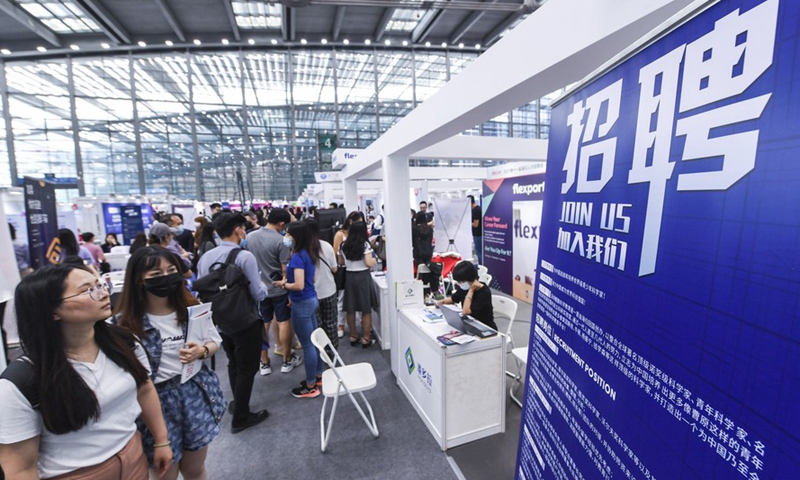
Overseas returnees visit a job fair during the 19th Conference on International Exchange of Professionals in Shenzhen, south China's Guangdong Province.File Photo: Xinhua
China is to pursue an "employment first" strategy, and a rich supply of human resources remains China's notable strength, said Chinese Premier Li Qiang, when addressing questions on China's demographic dividend and employment outlook at a press conference on Monday.
A record number of new college graduates are expected to enter the labor market this year. Meanwhile, the Chinese mainland's population fell in 2022, with some people worrying that the nation's demographic dividend may be disappearing.
Addressing China's youth employment situation, Li said that the government will further expand channels of employment and help and support young people to realize their potential.
China will have nearly 11.58 million fresh college graduates this year, a new record, Li said.
"This large number certainly adds pressure to employment, but if we look at it from a development perspective, it could be a good thing as they will inject energy and vitality into our society," Li said.
China aims to create around 12 million urban jobs in 2023 and targets a surveyed urban unemployment rate of around 5.5 percent, according to the Government Work Report.
The government will continue to take multiple steps to stabilize and expand employment, which includes supporting and regulating the development of new forms of employment.
"In the first two months of 2023, the job market perked up, as the economy recovers and hiring demand rises. China's job market will see an overall improvement this year," Li Changan, a professor at the Academy of China Open Economy Studies of the University of International Business and Economics, told the Global Times on Monday.
New employment forms are mainly related to the internet economy and new technologies, which created many jobs such as ride-hailing drivers and couriers, but there are also many problems, including long working hours and inadequate social security, Li Changan said.
"We should encourage their development and at the same time standardize their development," Li Changan said.
The job market remained generally stable in 2022, data from the National Bureau of Statistics (NBS) showed, with 12.06 million new urban jobs created, exceeding the annual target of 11 million.
Assessing the demographic dividend, Li said we should look at not just the quantity but also the quality of the population.
Li noted that China has close to 900 million working age people and every year 15 million more join the workforce, so a rich supply of human resources remains China's notable strength.
More importantly, more than 240 million people have received higher education in China, and the average number of years of education for new workforce entrants has reached 14 years.
"We can say that the demographic dividend has not disappeared. On the contrary, the talent dividend is gradually taking shape, and the impetus for development is still strong," Li said.




